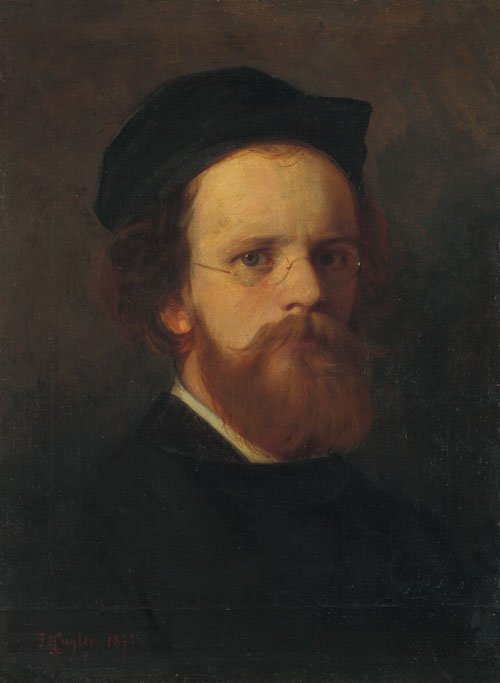Hans Kugler (1840-1873)
Roman Campagna at Dusk, c1864 🔴
Oil on Canvas, Signed “H Kugler”
Size:
The life of Friedrich Johannes Kugler reads like a Shakespearean tragedy and seems to confirm Schopenhauer’s suspicions that “life is an endless pain with a painful end.”
He was born in Berlin in 1840. His father, the art historian Franz Kugler (1808-1858), had already authored many books, commissioning a then unknown Adolph Menzel to illustrate one of them.
It is likely that Menzel was a frequent visitor; it was perhaps through his example that Kugler came to dispense with his studies in the natural sciences and became a painter instead. By 1860 he was studying with Arnold Bocklin (1827-1901) and Franz Lenbach (1836-1904) in Weimar. He painted Lenbach’s portrait in 1871 and managed to convince Adolf Friedrich von Schack that it would be prudent to buy Bocklin’s canvases sooner rather than later.
The art historian Walter Scheidig saw in Lenbach’s outdoor classes the beginnings of the Weimar School, a plein-air movement, which like the Barbizon colony strove for a greater realism in landscape painting. It is likely that Kugler accompanied his friend on these painting trips.
The following picture was painted during Kugler’s time in Italy (1863-1864), and suggests that he arrived at similar sentiments to Barbizon counterparts, whose later canvases were beginning to resemble the impressionists in all but name. For Kugler, the frenzied brushstrokes, recording the impression, without being overburdened by the details, was perhaps a consequence of an "ever-growing nervous ailment" which often left him unable to paint.
By the 1870s his health had declined to the point that he had largely ceased to paint and was beginning to suffer agonising stomach cramps, spasms and suffocation of the diaphragm - possibly suggesting he was in the latter stages of motor-neuron disease.
The playwright and novelist Adolf von Wilbrandt (1837-1911) wrote his obituary; the publisher Ernst Victor Keil (1816-1878) described how “his shocking end is of such a terrible tragedy that even in his grave it will win the hearts of all who hear the story of his life and passion.”
Wilbrandt suggests that Kugler had no ethical qualms with suicide, but could never bring himself to it because of an overwhelming love of his mother, by now his full-time carer and who had already lost one grandchild, two children and a husband prematurely. Nevertheless in December 1873, Kugler left a letter declaring his love to her, begging forgiveness, before taking a concoction of morphine and sleeping pills. On finding him, his mother kissed his forehead, before swallowing the vial of poison she had kept for him. Kugler woke up in hospital a few days later, caught wind of the tragic circumstances and attempted suicide four times over the next ten days before dying of grief on the 12th December 1873.
“Die Familie Kugler am Tisch” (Kugler Family at the Table) 1871 - Hans Kugler (1840-1873)
Collection Alte Nationalgalerie, State Museum, Berlin


